Misinformation confuses Qatar 2022 World Cup fans

The World Cup in Qatar has been receiving all kinds of rejection for years. With just a few days to go before it kicks off, there is concern about the consequences of acting against the strict Qatari laws. Disinformation is trying to mislead fans travelling to Qatar or following the event from home. Alleged prison sentences for flying the rainbow flag or that alcohol will not be allowed to be drunk are among them.
Qatar will allow the sale of alcoholic beverages to people over 21 in hotels, restaurants and licensed bars, but never on the street or other public places.
During the World Cup, "additional areas" will be set up in which "alcoholic beverages will be available", the Spanish Embassy in Qatar explained.
Alcohol will only be sold around the stadiums during the three hours before kick-off and one hour after.

An important new feature is that recovery areas have been set up for fans who are intoxicated, Nasser al-Khater, chief executive of Qatar 2022, told Sky News in an interview.
Smoking is also restricted. Smoking is banned in all public spaces, including museums, sports clubs, shopping centres and restaurants.
Qatar's stance against LGBTI rights has been one of the most criticised issues in recent months by countries, teams and governments around the world, but so far none have refused to come to Qatar.
Although no regulations have been enacted, it has been leaked that the Qatari authorities have assured that LGBTI people travelling to Qatar during the World Cup will not face any legal consequences.
World Cup spokesman Naser al-Jater said in an interview with CNN that a gay couple can go to the World Cup "as fans of a football tournament" and that "they can do what any other human being would do".

Waving the rainbow flag will be allowed in stadiums where matches are played, both FIFA and the World Cup organisers confirmed.
This will provoke acts of defiance from teams and fans who will seek to provoke the Qatari authorities with excessive behaviour that will have bad consequences for all parties. This is the case of Denmark and England, who have been so critical of Qatar in recent months but have not declined to attend.
Some fake news have warned that Qatar would ban extra-marital relations during the World Cup with penalties of up to seven years in prison.
Qatar's Penal Code criminalises extramarital affairs, although the rule predates the World Cup. Sources at the Qatari embassy told EFE news agency that the country asks visitors to respect "its values and traditions", as they would "in other parts of the world", adding that "Qatar is a relatively conservative society, public displays of affection are not part of our culture".
FIFA explains in its guide to the World Cup in Qatar that tourists "may generally wear clothing of their choice", so non-Qatari women are not required to wear the hijab, the traditional head covering. Swimming trunks are also allowed on the private beaches of hotels and swimming pools.
The organisation notes that visitors, both women and men, must cover their shoulders and knees when visiting public places such as museums and other government buildings.








